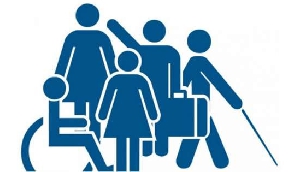The Ghana Federation of Disability Organisations (GFD), has appealed to government and stakeholders within the health sector to make sexual and reproductive health (SRH) services affordable to persons living with disability (PWDs) to enable them to access.
It also called on healthcare providers, especially nurses and midwives to end all forms of stigmatisation targeted at disabled people, particularly pregnant women to enable them to seek proper ante-natal and post-natal services to improve on their SRH.
The Federation made the call in Accra when it presented the findings of a study it carried out in April this year.
The study carried out by the Federation, with funding from Amplify Change United Kingdom was to ascertain the factors that impeded PWDs in their quest to access SHR services.
It was on the topic: "Stigma Related Issues Affecting Persons with Disabilities Accessing Sexual Reproductive and Health Right."
Mr Kwame Mensah, the Programmes Manager, who presented the findings said many PWDs continue to struggle to access healthcare, particularly those related to their SHR, due to their inability to afford them.
This, he said continue to impact negatively on their health, as well as infringes on their right to healthcare by all citizens, as enshrined in the 1992 Constitution.
Mr Mensah said a number of PWDs continue to grapple with unemployment, a situation he said adversely impacted their finances.
“This study we conducted sampled 80 PWDs of all forms. Out of this, 55 per cent of respondents were either in school, unemployed or had retired from active service. This implies that none of these persons are receiving any salary whatsoever and therefore depended on others for survival.
What it also means is that accessing health care by these persons will therefore be a challenge, Mr Mensah said and called for some free or minimised health cost for persons with disability.
The findings from the study are expected to be presented as a comprehensive national report to be used as an advocacy tool of engagement.
Mr Mensah said other barriers which continue to hamper PWDs access to SRH included institutional factors, personal, social, cultural and religious factors, among others.
He also urged civil society organisations, ministries, departments, agencies, municipal and district assemblies to collaborate to ensure that the national accessibility standards and the builders’ code are implemented and be made an important consideration in awarding of contracts.
“There should be a continuous engagement, sensitisation and awareness programmes with Ghana Health Service, aim at enlightening health personnel on disability and existing disability policies and legislation,” he added.
Mr Joseph Attigah, Deputy Director, Department of Social Welfare reiterated the need for all forms of stigmatisation against women with disability, particularly, pregnant women be ended, saying it was a disincentive for such women to seek for SRH.
He, however, commended the Ministry of Health for making sign language interpreters part of the health providers, to ensure all-inclusive healthcare delivery.
He further urged GFD to intensive its advocacy duty to ensure the desired result was attained.
General News of Saturday, 19 September 2020
Source: GNA



















